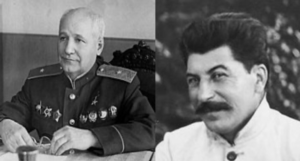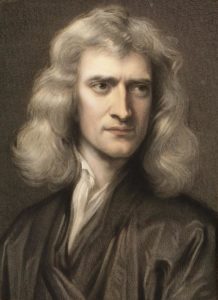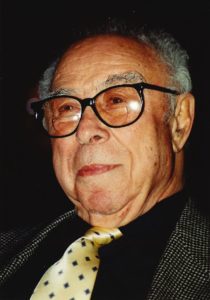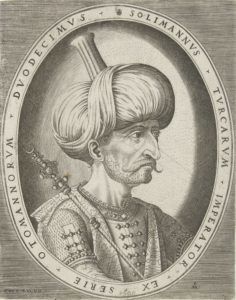
Although the presentations will be taped in advance, there will still be a live Q&A session following the online debut of each lecture, in which the speaker will be available to answer questions submitted by audience members.

Andrei Tupolev and Joseph Stalin
The totalitarian system that Joseph Stalin built in the 1930s relied heavily on terror to keep Soviet citizens in line. It also forced them to work for a dictator who took credit for his country’s successes and blamed others for its catastrophic failures. Millions of Soviet citizens suffered under Stalinist repression to such a degree that the Soviet Union was ill prepared to meet Nazi Germany’s invasion of the USSR in June 1941. One such victim was Andrei Nikolaevich Tupolev, an aviation pioneer whose aircraft designs had already made him a household name before the war. Instead of executing Tupolev, Stalin forced him to work inside the Gulag on airplane designs for the war and the dictator’s glory. And soon after the war, Tupolev obliged Stalin’s obsession with American technology by reverse engineering the B-29 bomber. Unlike most of Stalin’s victims, Tupolev outlived the dictator and led a design bureau that propelled the USSR into the Jet Age and even produced a supersonic passenger aircraft. Born in 1888, Tupolev’s incredible career spanned Russia’s turbulent 20th century from Tsar Nicholas II to Leonid Brezhnev before his death in 1972. This lecture explores Tupolev’s life, his relationship to Stalin, and how his cutting-edge designs for military and civilian aircraft helped make the Soviet Union an aviation superpower.

Sir Isaac Newton
On Tuesday, Feb. 2, Colleges of Arts and Sciences Dean and Professor of Mathematics Keith Mellinger delves into the life of Sir Isaac Newton. The Community Bank of the Chesapeake Lecture.
Born after the death of his father to a young woman of humble roots in rural England, Sir Isaac Newton grew to be regarded by many as the most influential scientist who ever lived. As a child, he showed great talent, and before ever reaching the age of 30, he laid the foundations for mathematical and scientific theories that proved to have lasting impact, including the laws of mechanical motion, calculus, optics, and more. Some have argued that it was inevitable for the time. Newton was born the same year as the death of the great Galileo and Newton himself said, “If I have seen further than others, it is by standing upon the shoulders of giants.” In his productive brilliance, he struggled to live a normal life, almost never cultivating meaningful relationships despite his insights into human behavior, once noting, “Tact is the knack of making a point without making an enemy.” In addition to gaining a deeper understanding of why Newton’s work remains so influential, we look at the man behind the science.

Art Buchwald
On Thursday, Feb. 4, local biographer Michael Hill will provide highlights from his highly anticipated biography on American humorist and Washington Post columnist Art Buchwald, which will be released by Random House in 2021. The Chancellor’s Village Lecture.
Before Stephen Colbert, Jon Stewart, and even before “Doonesbury,” there was Art Buchwald. For over fifty years his Pulitzer Prize winning column of political satire and biting wit made him one of the most widely read American humorists of his age. At the height of his career his column — published three times a week — was syndicated in 550 newspapers in 100 different countries. The power of his wit was legendary, some describing him as “Will Rogers with chutzpah.” Much like Mark Twain, James Thurber, and H.L Mencken, Buchwald was an American original. For over five decades it seemed as if everyone began their day by reading him as he satirized political scoundrels, lampooned the powerful and the pompous, and over his long career poked fun at ten different Presidents of the United States. Michael Hill is currently at work on a book based on the life, letters, and political satire of Art Buchwald. In his “Great Lives” lecture, Hill will not only explore the genius of Buchwald’s satire and humor, but also provide a colorful and lively portrait of the man and the humorist.
And for those who missed it, Professor of History and Middle Eastern Studies Nabil Al-Tikriti delivered a lecture on Tuesday, Jan. 26 on Süleyman the Magnificent. The Fredericksburg Savings Charitable Foundation Lecture. Watch here.

Süleyman the Magnificent
Commonly seen as ruling over the Ottoman Empire at the height of its power, the celebrated Sultan Süleyman the Magnificient (r. 1520-1566) left behind a number of compelling legacies for his family, state, empire, and government. In the course of his long reign, the empire expanded well into Southeastern Europe, Iraq, North Africa, and the Indian Ocean; governance grew increasingly professionalized and bureaucratized; and the Ottomans put forth credible claims for universal empire. His personal life was marked by a mixture of overt romance and tragedy, complete with an unstable inheritance from his father, unorthodox concubine marriage, two occasions where he ordered the execution of his own sons, his own dramatic death while on campaign, and an inauspicious transfer to his least beloved son. One of the giants of early modern monarchy, Süleyman, known as the “Lawgiver” in the Islamic World and the “Magnificient” in the West, certainly lived a life worth inclusion as one of the greats.
To learn more about Great Lives and view upcoming lectures, please visit https://www.umw.edu/greatlives/.